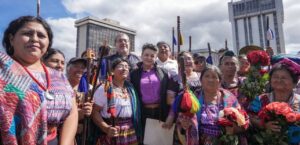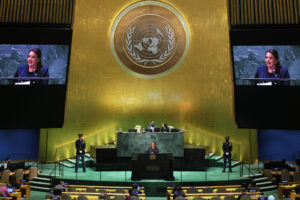Last week, the United States Treasury Department nominated Maurico Claver-Carone, currently the U.S. deputy National Security Advisor for Latin America, to be the next president of the Inter-American Development Bank (IDB). Presidents serve a five-year term; the current IDB president, Luis Alberto Moreno of Colombia, retires at the end of September, after three terms. Claver-Carone’s nomination raises significant concerns, which include:
1.) The nomination violates the IDB’s unwritten but important tradition that a Latin American leads the institution, with a U.S. citizen as executive vice president.
This has been the case since the IDB was founded in 1960. It reflects the recognition that a multilateral bank, whose formal role is to provide loans for development in Latin America, ought to be led by an official from the region.
This is a view that is shared by many experts and political leaders. Five former Latin American presidents wrote an open letter on this issue last week. The editorial board of the Financial Times weighed in, urging IDB member countries to “unite behind a well-qualified, Latin American candidate with the experience and the stature to lead the IDB at a critical time. Multilateralism matters.”
Although civil society groups have long-standing criticisms of the IDB and of other international financial institutions—on issues ranging from environmental and development policy, to civil society consultation, to the role that the developed countries play in governance—the U.S. government’s push to name a U.S. director to the IDB creates even bigger issues. It weakens multilateralism, it hampers positive reforms of the international financial institutions, and it undermines the influence of countries other than the United States in the system.
2.) Naming a U.S. head of the IDB shortly before a presidential election could complicate governance if there is a leadership change in the United States.
With contested presidential and congressional elections coming up in the United States, ensuring good governance of the IDB dictates waiting until there is clarity about U.S. leadership.
This is especially relevant given that the U.S. government also has to nominate a new executive vice president of the IDB (the current occupant of the bank’s second-highest position is serving in an interim role). In one possible scenario, a U.S. citizen as IDB president, named by one administration, could very well clash with an executive vice president named by a different administration, given possible differences in economic policy and approaches to multilateralism.
There is no significant downside to waiting until after U.S. elections to name a permanent successor to President Moreno. There have previously been gaps between the departure of one IDB president and the selection and assumption of office of another, so a postponement should not pose major problems for IDB operations.
Internal conflicts within the IDB would hamper the role that the bank, notwithstanding legitimate criticisms, will have to play in helping a region reeling from the impacts of COVID-19. We should take the steps needed now to avoid unnecessary governance battles in the future.
3.) Claver-Carone’s vision for the IDB and its role in Latin America could be deeply divisive.
Claver-Carone is a polarizing figure in U.S. foreign policy debates about Venezuela and Cuba. While civil society groups have criticized the IDB for pursuing “Washington Consensus” development strategies, the Bank has generally avoided charges of political favoritism among governments. Human rights and democratic governance conditions should be developed in a way that ensures independence from political and ideological agendas. Given Claver-Carone’s history, and the record of the Trump Administration on multilateralism in general, the IDB’s leadership could face significant internal disagreements, which would not bode well for the future of multilateral institutions in the hemisphere.
The nomination of a U.S. candidate for the IDB—right before a U.S. presidential election—is unprecedented, and poses serious questions about IDB leadership and governance, questions that have been echoed by senior Senators in the U.S. Congress.
Shareholders and member countries should postpone any decision until after the U.S. elections in November, in order to avoid a situation in which the IDB faces leadership and governance challenges.
In addition, shareholders should support the tradition of appointing a Latin American leader, as part of preserving multilateralism and political pluralism in the IDB.


